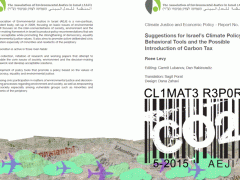
The government of Israel had decided on comprehensive budget cuts for the years 2013-2014, including a three year freeze of its National Plan for the Reduction of Greenhouse Gas (GHG) Emissions. The original plan was ratified by late 2010, and had allocated a total sum of NIS 2.2 billion to be used between the years 2011-2020. The plan was adopted as part of the effort to meet Israel's commitment, made by President Peres at the Copenhagen Climate Summit (COP15, 2009), to mitigate its GHG emissions by 20% from a business-as-usual scenario by 2020. Although the measures included in the original plan and its budgeting would not have sufficed to adhere to Israel's commitment, the plan came to be a significant landmark, since it was the first time that substantial steps have been taken within a framework of a multi-annual program to mitigate emissions. As a consequence of the plan's suspension in 2013, it has become evident that at the present rate, Israel will not be able to meet its GHG emission reduction targets.
The great deficit in the national budget, which led to the plan's suspension, does not alter the fact the GHGs continue to accumulate in the atmosphere, and that Earth's climate is changing, as stated by the latest IPCC report:
"This evidence for human influence has grown... It is extremely likely that human influence has been the dominant cause of the observed warming since the mid-20th century" (IPCC 2013, 12).
Israel must mitigate its GHG emissions as per its international commitment, and because it might be adversely affected by climate change, including by means of damage to its agriculture, diminished precipitation quantities, more extreme weather events, forest fires and health hazards associated with increasing heat waves.
Additionally, an early transition to a low carbon economy is likely to be beneficial for Israel, both by giving the country a comparative advantage in the international market for clean technologies and improving the efficiency of local industries. Furthermore, it stands to reason that in the future Israel will be required to mitigate its emissions, and therefore should preferably begin the process in a gradual manner.
The halt of the National Plan for the Reduction of GHG Emissions (despite its long term significance and its impacts on numerous government ministries had motivated the Association of Environmental Justice in Israel (AEJI) to initiate the research presented in this document, as part of its Climate Justice Research Project. In this paper we discuss two measures that could enable the State of Israel to mitigate GHG emissions originating from households, with no need for new budgetary resources. We further examine the implications of each of these measures in the context of environmental justice.
The first part of this document focuses on behavioral measures to mitigate emissions. A growing number of studies in recent years discuss the fact that often a change in the behavior of individuals can be achieved without exercising material incentives. We examine the relevance of literature on behavioral economics to environmental issues and its implications regarding environmental justice, and explore in which cases behavioral measures might be applied in Israel. The second part of the document focuses the discussion onto one of the measures considered to be most effective for mitigating emissions – a carbon tax. We explore the impact of said tax on different income deciles in Israel, and the possibility of applying an equitable carbon tax in the country.

